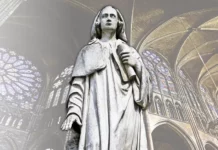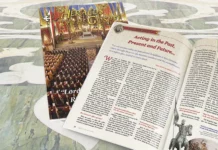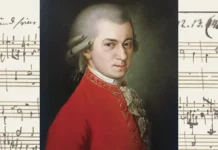The tremendous battle that every man must wage for his salvation is considered by some as an arduous challenge, by others as a great trial. St. Hildegard transformed it into a sublime oratorio!
Throughout history, countless poets, writers and brilliant artists have devoted their time to expressing through their works various aspects of human life, which, being essentially a great warfare (cf. Job 7:1), offers countless and fascinating nuances to highlight.
In the 12th century, St. Hildegard of Bingen – abbess, mystic, scientist, writer and even musician – succeeded, with great sensitivity and Christian piety, in setting the mysteries of the fierce battle waged between God and the devil on the mysterious battlefield of the human heart to music.
Intimate relationship between music and the supernatural life
St. Hildegard has elicited considerable interest over the centuries, and particularly after Pope Benedict XVI elevated her to the rank of Doctor of the Church in October 2012, her writings, the object of unceasing study, have become widely accessible on various websites.
In them the German mystic says that, when Adam was still innocent, his voice was “in great harmony with the angelic voices that praise God.”1 However, after having lost the state of grace, he found himself deprived of this capacity and the heavenly melody that inundated his soul faded away. The Creator then decided to touch the hearts of certain men over the course of time and pour out upon them the prophetic spirit, by which he would give them something of the musical capacity that our first father had lost.

Therefore, for Hildegard, music has an intimate relationship with the supernatural life of the soul and its union with God.
Within the vast work left by the Saint, we will focus our attention on the piece of music entitled Ordo Virtutum. We urge you, dear reader, to listen to one of the recordings of this true treasure of music and sacred drama, not only so that you may enjoy its soothing and innocent melodies, but also so that, by listening to it, you may understand more deeply the spirituality of its author and participate in the graces proper to the Middle Ages, especially its equilibrium in the fight against evil.
A work based upon a mystical revelation
Ordo Virtutum is the first medieval version of the oratorio as a musical genre, besides being the only drama dating back to that time of which we still know the melody in its original form and the provenance of its composition.
The musical piece was written under divine inspiration, as St. Hildegard herself relates in the last chapter of her book Scivias, when she contemplated and heard, in a mystical vision, something like a synthesis of her entire work transposed into different genres of music, performed by those who enjoy heavenly beatitude.
In the same supernatural manifestation, the Saint also heard the lamentations of those who had turned away from these joyful praises, and she saw the Christian virtues, endowed allegorically with their own personality, exhorting them to combat and resist the wiles of the devil.2
These supernatural realities were mystically revealed to her by something “like the voice of a multitude harmoniously singing a symphony.”3
Ordo Virtutum was probably staged in 1152 as part of the celebrations for the consecration of the Monastery of Rupertsberg, one of the foundations of the saintly Doctor, on the banks of the Rhine.
The characters
Written in Latin, the play narrates the battle of a soul searching for eternal salvation. The main characters are the virtues, which help her during the battle: humility, the queen of the virtues; charity, fear of God, obedience, faith and hope; chastity, which Satan attacks countless times; innocence, contempt of the world and virginity; heavenly love, discipline and modesty; mercy, discretion, patience; and finally victory, “the sweetest combatant”!4 Another character present is the devil, whose sinister role consists, obviously, in counteracting the influence of the virtues.
In the very opening melody of the play, listeners are quickly transported back to Old Testament times, when the patriarchs and prophets sing, “Who are these that appear like clouds?” Then the virtues enter the scene, declaring that their resplendence is due to the light of the Word of God shining in them.
The drama begins with the happy soul admiring the innocence that cloaks it, longing to go to Heaven, and living in perfect harmony with the virtues.
The symphony of a spiritual combat
The melodies aim to express the qualities of the virtues, letting us glimpse something of the supernatural sphere of each one. Thus, for example, the notes with which charity sings are very calm and enveloping: “I, charity, fair flower. Come to me, you virtues, I will lead you to the pure light of the blossoming bud.” This mellow quality contrasts intensely with the high tones and the vocally challenging intervals used by Victory when she declares herself to be “the strongest and swiftest fighter that treads on the ancient Serpent.” The belligerent harmonies with which the virtues respond to the cynical interventions of the devil also clearly manifest the atmosphere of struggle in which they find themselves.

At a certain moment, the tempter appears to the happy soul in order to seduce it and turn it away from the right path… Realizing the arduous combat that awaits it in this life, the soul laments and ruefully sings: “O arduous struggle, O heavy burden that I must bear…” And finally exclaims: “I know not what to do, nor whither to flee!” Aiming to fortify her against the stings of concupiscence, the virtues reiterate their admonitions, filling the first scene of the act with harmonious compositions.
However, soon a grating “Euge! Euge!” – devoid of any melody – returns to torment the soul: “Fool! Fool! What will you get for all these efforts? Look to the world, and it will warmly welcome you with honours.” In her work, St. Hildegard denies the tempter the privilege of music because, according to a revelation she received from God, Lucifer lost his musical gift when he fell from Heaven. Thus, throughout the warfare waged by the soul and the virtues against Satan, the latter manifests himself in simple, shrill utterances, which give him a repulsive and hateful note, an authentic reflection of his state.
As the play continues, intelligence and concupiscence come into conflict: the former, illumined by faith, points the way to life, but the heart, obsessed by the promises of the evil one, tends towards the paths of perdition. “God created the world, and I do not offend Him if I want to enjoy it,” affirms the soul with naivety, while Satan arrogantly declares: “Of what use is so much fear? And what good is so much love? I will give everything to whoever wants to follow me and do my will!”
The instability of the human heart ends up leading the soul to follow the paths of Satan… The virtues weep, in one of the most poignant melodies of the oratorio, at the loss of the innocence of the one they loved so much: “Oh, voice that weeps, this is the utmost sorrow! Woe, woe! We virtues groan and weep because the Lord’s sheep has strayed from life.” But instead of reproaching her for her faults, they seek to lovingly draw her back: “Come, O fugitive, come to us and God will accept you! […] Do not fear or flee, for the Good Shepherd seeks in you His lost sheep.” Meanwhile, humility declares to her: “Poor daughter! I want to embrace you, because the great Physician has suffered harsh and bitter wounds for you.”
Story of a spiritual daughter
Some interpret the events of Ordo Virtutum as the story of Richardis, one of the nuns formed by St. Hildegard and deeply loved by her, who around the year 1151 decided to abandon her…

In fact, Richardis von Stade, daughter of the Marquess of Stade and sister of Hartwig, Archbishop of Bremen, had occupied a key role in the life of the holy abbess, actively assisting her in the transcribing of Scivias and in founding the Monastery of Rupertsberg. St. Hildegard conceived an entirely supernatural love for the young nun, as she declared to the Archbishop of Bremen years later: “My heart was full of love for her, as the living Light taught me in a very clear vision.”5
Nevertheless, a tragic event eventually separated the two souls, when Hartwig, perhaps prompted by worldly ideas, orchestrated the election of his sister Richardis as abbess of the Convent of Bassum in Saxony.
In spite of Hildegard’s repeated entreaties, Richardis was seduced by the prestige of the position offered to her and, like the unfortunate soul of Ordo Virtutum, decided to abandon the path of sanctity at her teacher’s side in order to tread her own path.
St. Hildegard wrote in vain to the Archbishop and to his mother to prevent Richardis’ departure, and tried unsuccessfully to convince the nun of the providential nature of her mission with her: “Listen to me, child, to me, your mother, who speaks to you in spirit. My sorrow rises to Heaven! My grief is destroying the great confidence and consolation I once had in humanity. […] Once again I say to you: Woe to me, mother! Woe to me, O my daughter! Why have you forgotten me, like an orphan?”6
Finally, she resorted to only other possible solution, and asked the Roman Pontiff to intervene. However, Pope Eugenius III would do nothing in a case where family influence and the Stade’s fortune had come into play… In the face of the refusal of the ecclesiastical powers, St. Hildegard was finally forced to allow her spiritual daughter to depart.
Conversion and death of Richardis
The sad lamentation of the virtues in Ordo Virtutum may well represent the sorrow of the holy abbess at the desertion of her beloved disciple. A piercing sorrow, yet filled with a note of hope: “May all those unfortunate ones like myself lament with me, all those who, for the love of God, have cultivated in their hearts and minds such love – as I had for you – for someone who was snatched away from them in an instant, as you were from me. May the Angel of God go before you, may the Son of God protect you, and may His Mother watch over you. Remember your poor desolate mother, Hildegard, so that your happiness may not perish.”7 Such words, in fact, have a real analogy with the way in which, in the musical play, the virtues weep and invite the poor soul to conversion, assuring her that the whole heavenly Militia will rejoice at her return to the fold.
In Richardis’ case, this conversion produced such intense repentance that it brought about her descent into the grave a year after the separation. The account of her death by Hartwig, in a letter to St. Hildegard, is extremely moving: “She experienced the fate of all flesh, having scorned every honour I sought for her. […] She expressed, with tears and with her whole heart, her desire to return to your monastery and commended herself to the Lord through the intercession of His Mother and St. John. […] I ask you to love her as much as she loved you […] and to consider the tears she shed for your cloister before many witnesses. If death had not prevented her, she would have returned to you as soon as she had obtained permission.”8

Therefore, that which the demon had wished to break – the spiritual bond between mother and daughter – was stronger and deeper than the promises of worldly glory that intoxicated her. For Richardis, death came, like a gentle balm, to remedy the mistake she had made.
Her conversion resembles the return of the unhappy soul in Ordo Virtutum, who recognizes that the ways of the devil were evil and, despite the wounds the ancient Serpent had inflicted on her, asks the virtues: “Help me, so that in the Blood of the Son of God I may arise again.” Fortunately, Richardis, like the repentant soul of the drama, equipped with the “shield of Redemption” and helped by the Queen of Virtues, eventually overcame the tempter!
How goes the “Ordo Virtutum” of our lives?
The fascinating battle portrayed in Ordo Virtutum is unquestionably the reality of our lives in this vale of tears. Now, what role do we play in this struggle? Are we the happy soul who, innocent, journeys straight to Heaven? Or, on the contrary, are we in the lamentable situation of the unfaithful soul who abandons the company of the virtues to share the bitterness of hell?
If the latter case more closely describes us, let us not be discouraged or waste time! Let us immediately imitate the humility and sincerity of the penitent soul, which repents of its faults and returns confidently to the bosom of Holy Church. Let us turn to Our Lady, asking Her to have pity on us and to forgive us, purify us and strengthen us in the ways of goodness. Thus, in the company of the just redeemed by the Precious Blood of Christ, we will be able to sing for all eternity the wonders of divine mercy. ◊
Notes
1 ST. HILDEGARD OF BINGEN. Briefwechsel. Salzburg: Otto Müller, 1965, p.238.
2 Cf. ST. HILDEGARD OF BINGEN. Scivias. Sive visionum ac revelationum. L.III, v.13: PL 197, 729.
3 Idem, ibidem.
4 All the references to the text of Ordo Virtutum were taken from: ST. HILDEGARD OF BINGEN. Lieder. Salzburg: Otto Müller, 1969, p.308.
5 ST. HILDEGARD OF BINGEN, Briefwechsel, op. cit., p.100.
6 Idem, p.98.
7 Idem, ibidem.
8 Idem, p.99.







